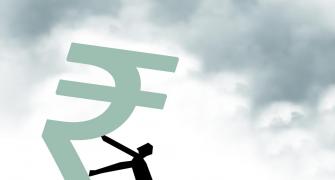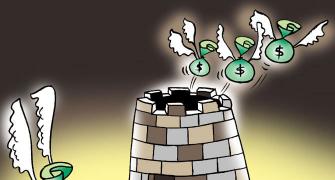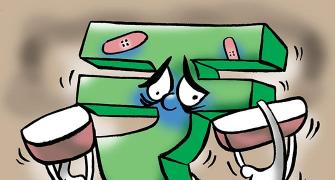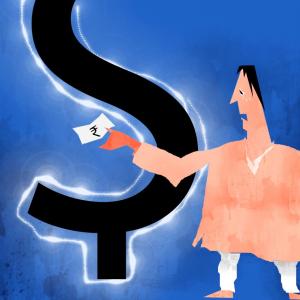'To simply let the rupee depreciate to any level according to market forces will not be in the country's interests.'
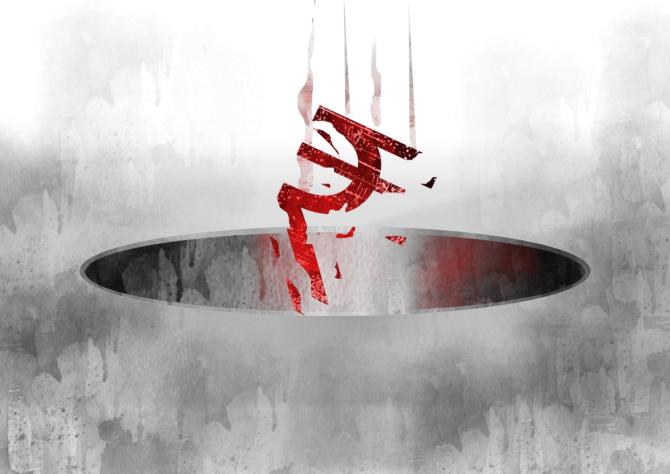
"Rather than letting the rupee depreciate to any level, the RBI should adjust interest rates sufficiently to attract capital inflows," Subhash Chandra Garg, former Union finance secretary and author of The $10 Trillion Dream, tells Rediff.com's Syed Firdaus Ashraf in the concluding segment of a two-part interview.
Does it mean the Reserve Bank of India pumping in $100 billion in the market to strengthen the rupee has not helped much?
If we continue to do so, will we reach the situation of the South East Asian financial crisis of the 1990s where countries were defending their local currency against the dollar?
Do you feel the government should let the market decide the rate of the rupee?
There are two ways to correct the imbalance in the demand and supply of dollars.
One way is that you meet the gap by providing the reserves so that the gap is met, and the second one is that you allow the market exchange rate to adjust where the supply and demand of the dollar and rupee become equal.
Let us say theoretically if you allow the rupee to depreciate further, then capital flows might return again. And if the capital flows come back, they will cover the (rupee-dollar) gap.
But the structure of our current account, especially the trade account, is such that a higher rupee depreciation does not actually clear the imbalance in the trade account.
As I said earlier, our dependence on oil, gold and electronics is so high that whatever the price, you (Indians) would buy that. You cannot cut down on that expense.
My sense is the suggestion that you should allow the rupee to depreciate to any market-determined level is a bit of a casual kind of suggestion.
In the Indian situation, fierce depreciation will not clear the current account depreciation and for the capital account to be effective and for it to return, the Reserve Bank of India needs to do much more.
Much more in what terms?
The RBI must make interest rates in the domestic economy rise more for the differential between the dollar interest rate in the USA and the rupee interest rate here. That gap must be attractive enough.
So, rather than following the policy of letting the rupee depreciate to any level, the RBI should follow the policy of adjusting the interest rates sufficiently to attract capital inflows.
And to simply let the rupee depreciate to any level according to market forces will not be in the country's interests.
Among the three policy options that we have:
a. Allowing depreciation
b. Using the reserves to stabilise the rupee
c. Adjusting interest rates in such a way that capital flows start.
I think a combination of the three is required more than any one of them.
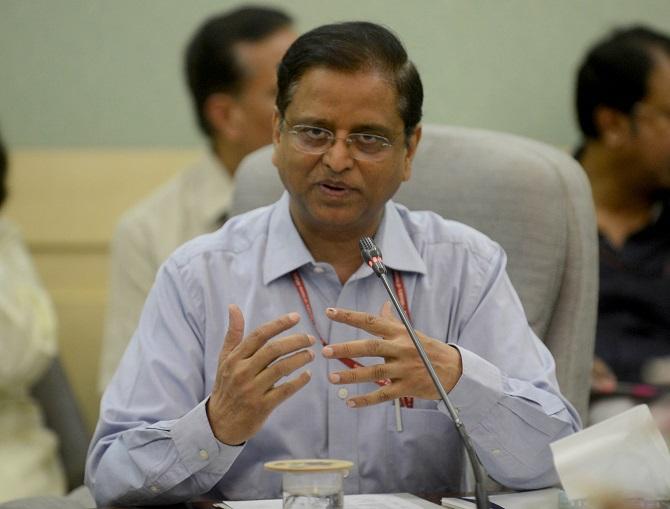
But when a weak yen can help Japan in exports, why can't the same logic be applied to the rupee where a weaker rupee will help Indian exporters to be competitive in the international market?
Our export structure is again not flexible enough for exports to rise if the currency depreciates.
What do we export? We export agricultural products and that too only to a certain level and not beyond because it is a sensitive matter.
This time the prices of wheat in the international markets were rising, but we ended up banning wheat exports.
When the steel prices were attractive for exports, we put export duties to see that domestic steel supplies do not suffer.
So, we do not have those kinds of export goods which will rise enormously if the rupee were to depreciate.
It is just like our imports are inflexible, our exports too are not flexible enough to be rising.
Any such theoretical suggestion that a rupee depreciation will help our exports is only good in a theoretical manner and not in practice.
What about international trade settlements in the rupee? Only five countries have so far opted for it.
These are peripheral measures and I do not think it will make a real difference.
You have to look at it this way, importers of which country will pay for Indian exports in rupees?
Or for that matter, which Indian exporters will want to take Indian rupees for the goods that they export?
I sense that still there is no fascination for anyone to take the rupee when it comes to doing international trade by seeing the rate of the dollar.
There might be some interest in countries like Bangladesh, Nepal and Sri Lanka for the Indian rupee as they are regionally integrated with the Indian markets.
In the case of Bangladesh and Nepal, we are net exporters to those countries and these countries will be more than happy to pay in Indian rupees to reduce their dollar deficit, but Indians would not be happy to let Bangladeshis pay in Indian rupees.
Today, we are getting dollars from Bangladesh and if they end up paying in Indian rupees, then we will end up in getting a lesser inflow of dollars into India.
I would be happy if even 1 or 2 percent of our exports and imports is done in rupees in coming times but do not keep too much expectation from this move.
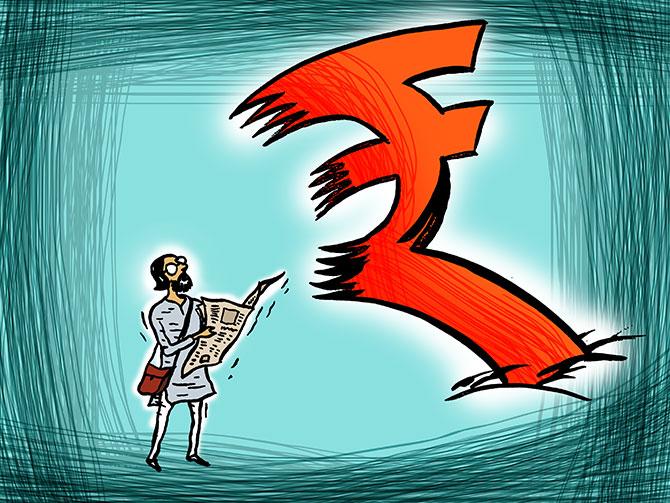
When the US government raises interest rates, FIIs run away from countries like India. How long will they keep dictating terms to the world with their dollar dadagiri philosophy?
This is another bogey, according to me. The US government is managing its economy and the dollar is its currency.
Now it happens such that the world trades in dollars and happens to believe the dollar asset as the most preferred asset.
Human beings are usually assigned to one single currency and at some point in history it was gold, then US sovereign and now the US dollar for the last 50 years.
Whether it is the renminbi or euro they have very little influence outside their own territory or even it has, it is only in the periphery of its borders and very little is transacted in pounds these days.
The dollar is the global currency.
If the rest of the world or India trades in some other currency, then whatever happens to that currency will have to be taken into account.
Now you may call it dadagiri or whatever you want to say, but the fact remains that is the currency, we will always be the recipient and reacting to the management of interest rates of the currency in that country.
So, the solution is -- the rest of the world must come up with some alternative currency in which everyone can trade.
It is not easy to do so as there have been attempts to make the SDR (Special Drawing Rights) as the global currency, but there is no demand or effort on this.
Therefore, I think we will continue to live in a dollar-dominant world.
Instead of blaming or breast-beating, it might be advisable to strengthen your own currency and economy.
Today, China does not care about dollar appreciation as most of the time they would want the Chinese renminbi to depreciate against the dollar so that they can export much more. Americans are dependent on Chinese exports.
I don't think this is something that one needs to crib about, and one should better manage our own economy and its currency.
When you see countries like Sri Lanka going bankrupt and on social media people say these things can happen in India as well because we are blowing up too much of dollars to strengthen the rupee, what do you think?
What Sri Lanka is facing today, India faced in 1991.
In the 1980s we lived like what Sri Lanka lived in the last 15 years.
In the '80s we borrowed heavily, our economy was closed and the production system was weak.
We had built up vulnerability on trade account and at some point of time we had no dollars to pay for imports as there were no reserves left.
But thanks to the sagacity of the people who managed that situation then, they took the right kind of measures by even hypothecating our gold for some time and did the right kind of measures by introducing trade reforms, currency reforms, and made India change into a completely different situation.
The Sri Lankans should have learned from India, but they did not learn anything from our past.
For the last 15 years, they were borrowing like crazy and their domestic account was so weak that they did not collect taxes and only spent money, resulting in large amounts of deficit.
They ruined their economy and it is only they who are to be blamed.
And believe me, today India is nowhere near Sri Lanka.
When people in India say such things, they have no knowledge about the real economy.
There is zero chance that India will end up like Sri Lanka now.
I would not use the word never though, because if India follows the policies of Sri Lanka for the next 10 years, then we too can return to the 1991 situation once again.
Sometimes the situation changes badly despite you not doing adversely.
Take the example of Bangladesh, they have been showing good growth in the last 15 years. Fiscal accounts are perfect.
External accounts are much better, but they are also dependent on oil and energy imports.
Therefore, this year for the first time they are getting into a current account trade deficit situation and so they are taking the correct measures right away by asking the International Monetary Fund to loan $4.5 billion.
It is not out of desperation like Sri Lanka, but out of precaution to shore up their reserves till the situation improves.
India is not even near the Bangladesh situation now.
Feature Presentation: Rajesh Alva/Rediff.com

